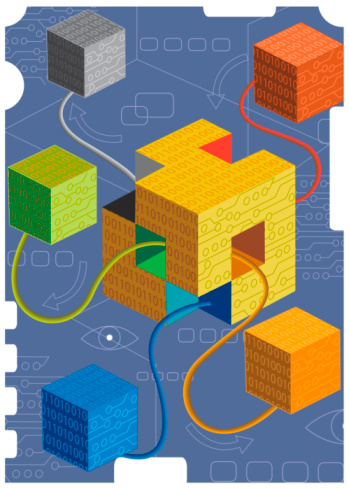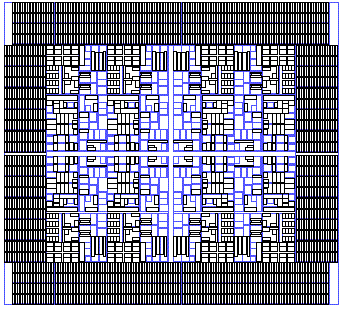10 nm 8-CORE finFET MERCHANT CPU STRESS TEST CASE
FIN PITCH DOUBLING VARIANT
A preliminary version of a 7 nm finFET eight-core commercial CPU synthetic design/stress test case is available for download now on the Yotta FTP site. This is intended to be similar to a high-end Intel or AMD processor chip.
- 16 nm drawn gate length
- 48 nm SRAM contacted gate pitch
- 96 nm by 400 nm single-port SRAM core bit cell size
- 96 nm by 600 nm two-port SRAM core bit cell size
- 144 nm by 760 nm three-port SRAM core bit cell size
- two layers of local interconnect
- six layers of metal
- 20 nm fin pitch
- self-aligned double patterning (SADP) for fins
- 1-D gate layer
- 2-D routing
Each processor core has 3-port SRAM for the level 1 cache and register blocks, plus 2-port SRAM for the level 2 cache. Additionally, there is 1-port level 3 cache SRAM around the perimeter of the die. The overall design is about 9,012.5 microns wide and 8,163.8 microns high.
The family of 10 nm finFET design rules used for this design has self-aligned double pattern (SADP) fin generation, a 16 nm drawn gate length, a 48 nm contacted gate pitch, one layer of local interconnect, six metal layers, 48 nm routing pitches for lower metal layers, and 60 nm routing pitches for upper metal layers (metal 4 and up).
All transistor gate layer geometry is vertical. Because the metal 2 through metal 5 layers allow 2-D routing, they have via doubling. Except for this, geometry on any given metal layer runs in a single direction (horizontal or vertical).
Design rule variants in this family can have 1-D routing on any subset of gate or routing layers (except metal 1), or diffraction gratings with blockage or cut masks on any subset of gate or routing layers. Contact Yotta Data Sciences for more information or to request a demonstration file using a particular variant.
Production 10 nm finFET 8-Core (0001) Merchant CPU Test Case Data Sheet
 | ||||
"The Company's technology established a common expectation amongst suppliers and customers regarding matters of OASIS compliance, performance and interoperability"
Naoya Hayashi
Electronic Device Laboratory
Dai Nippon Printing Co., Ltd
typedef struct _oasisReaderPath {
oasisUInt layer,dataType,halfWidth;
oasisInt startExt,endExt;
rawPointList *ptList;
oasisPropertyList *propList;
} oasisReaderPath;
Sample finFET Design Test Cases
OAS = OASIS
GDS = GDSII
Workflow Auditor Point Tools
{0|1} = Cut Mask
{0|1} = Blockage Mask
{0|1} = Diffraction Grating
{0|1} = Fin Pitch Doubling
0 = Not a variant
1 = Variant
| = or
®
TM
© Getty Images
NEW at Yotta Data Sciences
* US Patents 9,122,825, 8,555,219, 8,266,571 and 7,685,545.
International Patents: China 200980129771.8, Japan 4768896, Korea 10-1580258, Israel 209907, European Patent 2310967.
OASIS® is a Registered Trademark of Thomas Grebinski
© 2008-2024 Yotta Data Sciences, Inc. All rights reserved.
February 16, 2024- Yotta is offering, to qualified partners, a six-month evaluation-period, with support, for its SEMI P39-0416 OASIS Reader/Writer Source Code.
Visit Page: OAS Reader/Writer
Visit Page: OAS Source Code





